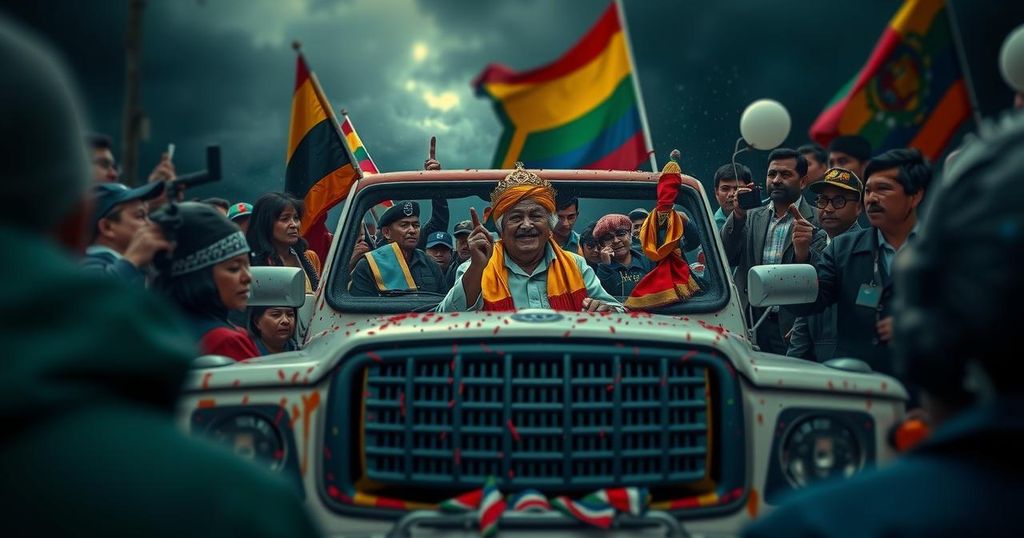Evo Morales Reports Gunfire Attack as Political Tensions Escalate in Bolivia

Evo Morales, the former President of Bolivia, stated that his vehicle was shot at during an attack he attributed to the current government. The incident illustrates the rising political tensions between Morales and President Luis Arce, amidst ongoing protests and allegations of destabilization efforts. Morales has faced criticism for road blockades, while also dealing with serious allegations against him personally. The political landscape remains fraught as Bolivia approaches its 2025 elections.
Evo Morales, the former President of Bolivia, reported on Sunday that his vehicle was targeted by gunfire, an incident that has been documented in a video he shared on social media. The footage shows Morales seated in the front passenger seat of a moving car, which displayed at least two bullet holes in the windshield; the driver, he revealed, sustained injuries during the ordeal. Morales attributed blame for the attack to the current government, led by his former ally, President Luis Arce. The reported attack underscores the escalating political tensions in Bolivia, where supporters of Morales have organized significant protests, including road blockades that have disrupted the flow of essential supplies. In a radio interview, Morales recounted that two vehicles confronted him on the road and opened fire on his car, narrowly missing his head with a bullet. He expressed uncertainty regarding whether the assailants were military personnel or police officers. In response, Deputy Security Minister Roberto Ríos declared that the police had not launched any operations against Morales and emphasized the need for a thorough investigation into the matter, regardless of its validity. The Bolivian government had previously accused Morales of inciting instability within the nation through ongoing blockades, which have stagnated food and fuel deliveries. They suggested that some factions aligned with him are armed, and cautioned against potential violence, citing that 14 police officers were injured while attempting to dismantle the blockades. Despite the shared political background of Morales and Arce as members of the Movement for Socialism (MAS) party, their relationship has deteriorated over the past year amid increasing political rivalry in the lead-up to the 2025 elections. Amidst these tensions, Bolivia faces critical challenges including declining gas production, a decrease in foreign currency reserves, and escalating inflation, all of which have contributed to mounting pressures on the ruling party and heightened political strife. Morales is also contending with serious allegations regarding inappropriate relationships with minors, leading to a formal summons from local prosecutors, which he ignored. Consequently, there is now an arrest warrant issued against him, which he has publicly denied.
The political landscape in Bolivia has become increasingly volatile, especially following the resignation of Evo Morales in late 2019. Morales, who served as president from 2006 until 2019, is presently at odds with the current administration led by President Luis Arce, who was formerly his economy minister. Their relationship represents a power struggle within the Movement for Socialism (MAS) party, ahead of presidential elections slated for 2025. As the country grapples with economic difficulties, including inflation and dwindling gas production, Morales’s supporters have been actively protesting, leading to significant civil unrest in the form of blockades and clashes with law enforcement.
The incident involving Evo Morales, including allegations of gunfire directed at his vehicle, highlights the escalating political instability and tensions within Bolivia. As Morales and President Arce’s rivalry deepens, the country faces critical economic challenges that exacerbate the unrest. The situation remains precarious, with potential implications for public safety and national governance as both sides accuse each other of undermining stability and democratic order.
Original Source: www.theguardian.com







